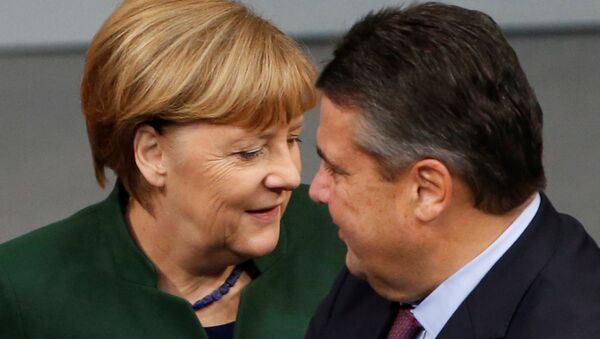Gabriel, whose Social Democrat party (SPD) are the junior partners in the Angela Merkel-led grand coalition government, said more budget flexibility and spending leeway needed to be given to countries like France and Italy, amid fears of an increase in support for populist politicians.
#German Vice Chancellor tells Der Spiegel insistence on austerity has divided Europe, break-up of EU no longer inconceivable #VOAalert
— Jamie Dettmer (@jamiewrit) January 7, 2017
"I once asked the chancellor, what would be more costly for Germany: for France to be allowed to have half a percentage point more deficit, or for Marine Le Pen to become president?" he told der Spiegel magazine, referring to the French far-right Front National leader.
"Until today, she still owes me an answer," added Gabriel, who as economy minister has called for more flexible spending rules and greater focus to be placed on investment, instead of the tight fiscal discipline pursued by Merkel's conservatives.
Anti-Austerity Push
While many may see Gabriel's attack on Merkel as a means of differentiating his party from the CSU ahead of this year's elections, his criticism of strict austerity policies is shared throughout large parts of the EU, with France, Italy, Greece and Portugal among those calling for greater public investment to boost growth in the Eurozone.
Last year, Greek leader Alexis Tsipras called for the creation of a southern European anti-austerity alliance to combat the German and northern European economic orthodoxy.
German posturing as the maestro of EZ austerity is misplaced. France restricts as severely. Italy and Spain vastly more. pic.twitter.com/fkmkCsrhbs
— Adam Tooze (@adam_tooze) January 3, 2017
Gabriel's comments also come amid an increase in anti-EU sentiment across the bloc, with senior figures in Brussels concerned over the rise in support of Euroskeptic movements, particularly with national elections in the Netherlands, France and Germany this year.
While admitting that loosening fiscal rules and potentially allowing German money to be transferred to other EU countries was "extremely unpopular," Gabriel said action was needed to prevent the EU from splitting.
WIN/Gallup International poll — Remain in the EU:
— Alberto Nardelli (@AlbertoNardelli) December 30, 2016
IRE 80%
ES 80%
DK 75%
DE 75%
BE 74%
SWE 71%
FRA 68%
AT 67%
FI 60%
ITA 60%
GRE 54%
"I also know about the state of the EU. It is no longer unthinkable that it breaks apart," he said.
"Should that happen, our children and grandchildren would curse us," he added.
"Because Germany is the biggest beneficiary of the European community — economically and politically."




